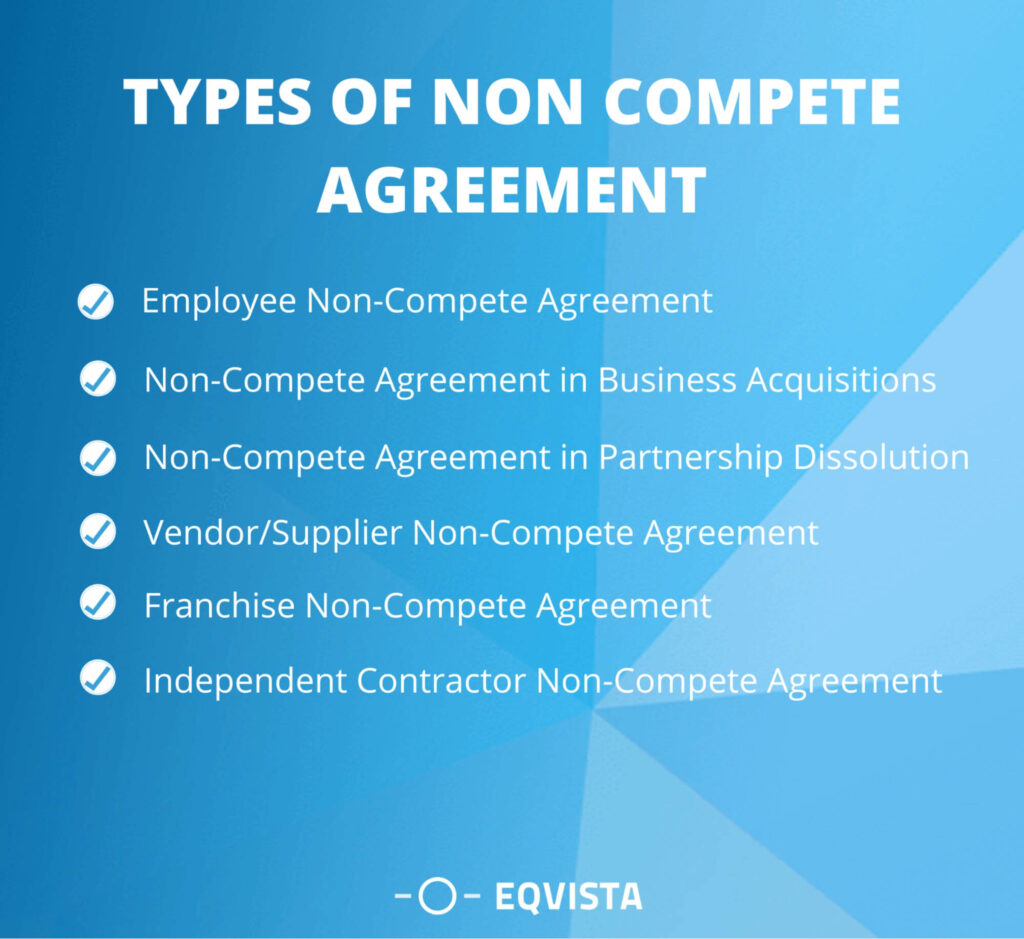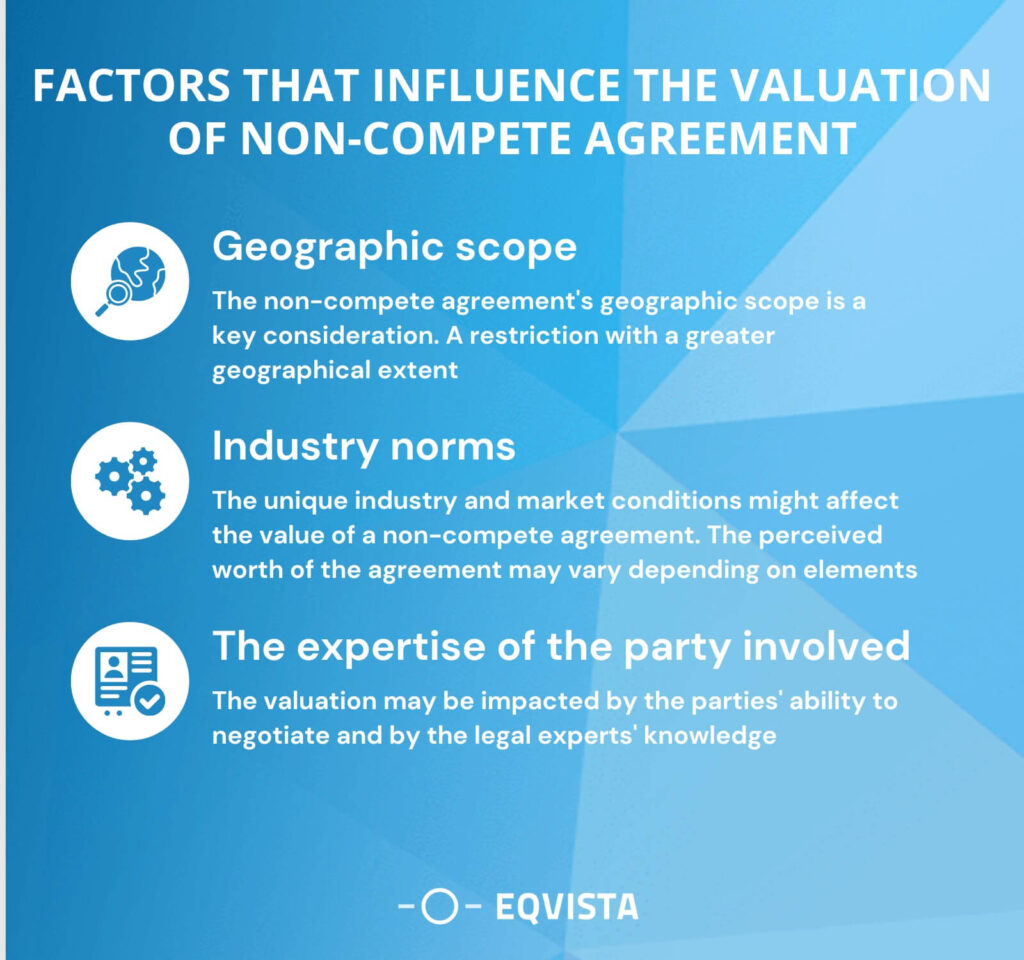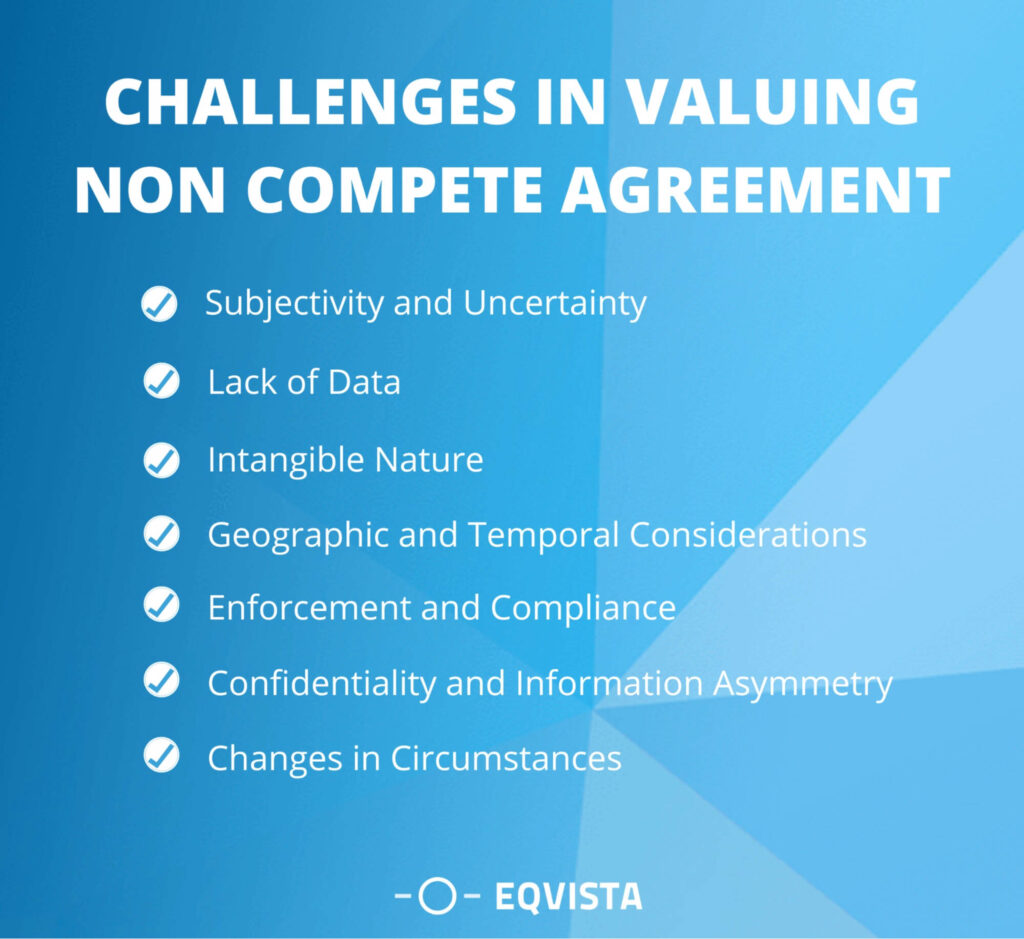Valuation of non-compete agreements
This article narrates the Types of non-compete agreements, Factors that influence the valuation of non-compete agreements.
Non-compete agreements are clauses in a contract that forbid one party from taking competitive actions that would affect the other party’s economic interests. These agreements are frequently used in a variety of businesses to safeguard proprietary information, client relationships, and trade secrets. It is critical to value non-compete agreements for various reasons. Non-compete agreements are often valued using a combination of qualitative and quantitative methodologies.
Valuation and Non-Compete Agreement
Non-compete agreement valuation techniques include qualitative and quantitative techniques. These legal terms are frequently used in commercial activities like mergers and acquisitions, fundraising, selling, and financial reporting.
Restrictive covenants or non-competition provisions, commonly referred to as non-compete agreements, forbid one party from competing with another. They are frequently employed when one party wants to stop the other from entering a certain market or sector.
What is a Non-Compete Agreement?
A non-compete agreement is a contract between two parties, typically two persons or one firm and one individual, wherein one of the parties commits not to engage in business competition with the other after their connection with the other party has terminated.
How does non compete agreement work?
A non-compete agreement (NCA) is an enforceable contract that forbids the signee from using any competitive advantages acquired as a result of their affiliation with another party. Usually, it specifies the duration and area of the NCA’s application. The goal is to safeguard the employer’s commercially valuable assets, including trade secrets, intellectual property, and private data such as customer information and marketing strategies.
Types of Non-Compete Agreement
Various non-compete agreements can be employed, based on the particular circumstances and legal system. Here are a few prevalent varieties.

- Employee Non-Compete Agreement – This is a comprehensive non-compete clause that forbids the employee from taking any competitive actions against the employer’s business, usually within a certain geographic area and for a specific amount of time.
- Non-Compete Agreement in Business Acquisitions – The major goal of this sort of non-compete agreement is to safeguard the acquiring company’s goodwill, trade secrets, customer base, and other intellectual information that is vital to the operation of the acquired business.
- Non-Compete Agreement in Partnership Dissolution – A non-compete clause may be a part of a partnership separation agreement to safeguard the interests of the surviving members of the partnership itself. When a partnership dissolves, the partners may decide to insert a non-compete clause to ban one or more partners from directly competing with the partnership or taking part in similar commercial operations for a predetermined amount of time and within a predetermined geographic area.
- Vendor/Supplier Non-Compete Agreement – The Parties acknowledge that the Vendor/Supplier and the Company have a business relationship whereby the Vendor/Supplier offers products or services to the Company. Both Parties agree to the terms and conditions set out in this Agreement in order to safeguard the Company’s confidential information, customer relationships, and competitive advantage.
- Franchise Non-Compete Agreement – A franchise non-compete agreement is a written agreement between a franchisor and a franchisee that forbids the franchisee from operating a business that is comparable to but competes with the franchisor while the franchise agreement is in effect or later. A non-compete agreement serves to safeguard the franchisor’s name, trade secrets, and commercial interests.
- Independent Contractor Non-Compete Agreement – An independent contractor non-compete agreement is a legal contract between an independent contractor and a hiring party that tries to safeguard the hiring party’s economic interests. This agreement prohibits the independent contractor from engaging in activities that directly compete with the hiring party during or after the length of their contract.
Benefits of Non-Compete Agreements
Non-compete agreements limit employees’ ability to work for competitors or start their own firms for a set period of time, offering employers advantages such as reduced competition and geographic limits.
The following are some possible benefits:
- Non-compete clauses can protect a company’s confidential business information, including client lists, marketing plans, trade secrets, and other information.
- These clauses might restrict departing employees from immediately soliciting or serving the employer’s clients in sectors where strong client ties are essential.
- Non-compete clauses can assist corporations in keeping their market edge by preventing employees from working for rival companies.
Companies frequently devote time, money, and resources to employee training, especially in professions requiring specialized abilities or technical expertise. - Non-compete clauses can be a useful tool for luring and keeping top talent.
Valuation for Non Compete Agreement
There are two questions that must be answered when valuing a non-compete agreement.
- How much of the company’s future earnings could the previous owner take if he or she opted to compete with the new company?
- What is the possibility that the previous owner would participate?
The subjective process of valuing a non-compete agreement necessitates a careful evaluation of these variables in light of the unique situation.
Importance of valuing Non Compete Agreement
Understanding the value of a non-compete agreement is essential for various reasons. Here are some crucial considerations emphasizing the need of appreciating such agreements.
- The intellectual property, trade secrets, and confidential data of a corporation are protected by a non-compete clause.
- A non-compete pact aids in maintaining a business’s edge in the marketplace.
- Customers frequently form close bonds with particular staff or business associates.
- Important non-compete clauses can raise a company’s overall value.
- Non-compete agreements must be valued in order to be enforceable in court. A well-structured and valuable agreement raises the likelihood of effective enforcement if a corporation needs to take legal action against a former employee or partner who violates the agreement.
Factors that influence valuation of Non Compete Agreement
A non-compete agreement’s value can be affected by a number of variables. Here are some crucial considerations.

- Geographic scope – The non-compete agreement’s geographic scope is a key consideration. A restriction with a greater geographical extent, such as a countrywide restriction, may be valued more highly than a restriction with a regional or local reach.
- Industry norms – The value of a non-compete agreement might be affected by the unique industry and market conditions. The perceived worth of the agreement may vary depending on elements including industry competitiveness, market demand, and growth possibilities.
- The expertise of the party involved – The valuation may be impacted by the parties’ ability to negotiate and by the legal experts’ knowledge. A greater price for the non-compete agreement might be possible with the help of savvy negotiators and legal counsel.
Methods of valuing Non Compete Agreement
Valuing a non-compete agreement can be a difficult undertaking because it requires considering the prospective impact on the parties involved as well as the specific circumstances surrounding the agreement. The following strategies are frequently employed:
| Approach | Features |
|---|---|
| Income approach | It entails calculating the predicted future revenues or profits that the party subject to the agreement could achieve if they were not constrained by the non-compete clause. |
| Cost approach | Evaluates the non-compete agreement's worth by estimating the costs of enforcing the agreement or the prospective expenses of a breach. |
| Excess earning method | Estimates the value of a non-compete agreement by evaluating the additional earnings that can be created as a result of the agreement above and beyond what would be expected without it. |
| Probability weighted approach | It entails determining the expected value based on the probability that is assigned to distinct circumstances. |
Challenges in valuing Non Compete Agreement
It might be difficult to value non-compete agreements because of a number of issues. Here are some major issues to take into account.

- Subjectivity and Uncertainty – A non-compete agreement’s worth is arbitrary and dependent on the specifics of each situation. It relies on elements like the industry, region, length, and nature of the agreement. It can be difficult to pinpoint a precise impact on a company’s profitability or competitive advantage.
- Lack of Data – Non-compete agreements forbid people from taking part in certain activities that would put them in direct competition with their former employer. However, calculating the potential financial harm caused by a breach of the agreement might be difficult. Estimating the actual financial impact becomes challenging in the absence of historical data or verifiable proof.
- Intangible Nature – Non-compete agreements might be complicated by their intangible nature. It forbids a person from working in competition with a previous employer for a predetermined amount of time and within a predetermined geographic area after leaving their position. It can be more difficult to restrict intangible factors, like general knowledge and abilities gained through a job.
- Geographic and Temporal Considerations – Non-compete agreements may face substantial difficulties due to geographic and temporal factors. Employees frequently operate remotely or across multiple geographic regions in the modern, international business. Determining the proper geographic scope of a non-compete agreement presents a hurdle. The contract may be deemed irrational and unenforceable if it covers a huge geographic area and is too broad in scope.
- Enforcement and Compliance – The enforceability of non-compete agreements varies by jurisdiction. Some regions have tight restrictions that limit their legitimacy, while others uphold them more freely. The legal environment makes the valuation process more challenging because an agreement’s enforceability has a huge impact on how much it is worth.
- Confidentiality and Information Asymmetry – Employers and workers must share confidential information in order to uphold legitimate business interests under non-compete agreements. Employees might violate the agreement by using or disclosing this information in a new job. Non-compete clauses are affected by information asymmetry, which can make it difficult for employees to find new jobs and occur when one party has access to more or better information than the other.
- Changes in Circumstances – Non-compete agreements may cause problems if a person receives a promotion or experiences a significant shift in their job. Given the employee’s new responsibility, courts may assess the agreement’s scope and reasonableness. Non-compete agreements’ enforceability may be impacted by market changes and economic conditions, which may limit employees’ options for new employment.
Eqvista’s Non-Compete Agreement Valuation with Expert Assistance
It is crucial to note that the valuation of non-compete agreements is frequently subjective and may require negotiation between the parties concerned. Additionally, non-compete agreements’ enforcement and validity can differ between jurisdictions, so it’s important to consult with legal and financial experts who are knowledgeable about the pertinent rules and legislation.
At Eqvista you can avail the expert assistance on the same. Contact us right now to know more about our services.
Interested in issuing & managing shares?
If you want to start issuing and managing shares, Try out our Eqvista App, it is free and all online!
